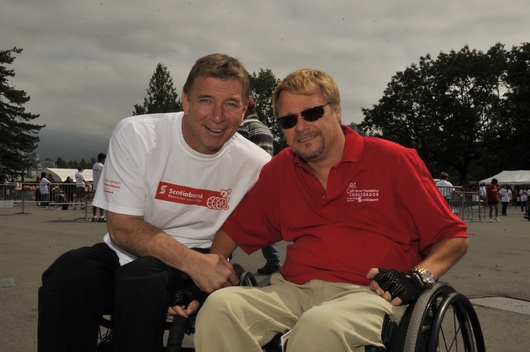Towards a World Without Paralysis After Injury
By Daryl Rock, Chair of the Board of Directors, RHI
Twenty-five years ago, the possibility of finding a cure for spinal cord injury (SCI) inspired Rick Hansen’s Man in Motion World Tour. Today, with support from governments, corporations and individuals alike, the Rick Hansen Institute (RHI) is bringing Hansen’s dream to life with a vision of a world without paralysis after spinal cord injury.
RHI represents a relatively new umbrella organization for networks and initiatives that have been strongly supported in the past by federal, provincial, and non-governmental stakeholders. The predecessor organizations, working with strong partners such as the Rick Hansen Foundation, have made major contributions to SCI research, helping to establish and maintain Canada’s reputation as a global leader in the field.
Our Vision:
A world without paralysis after SCI. While SCI itself is unavoidable, eradicating permanent paralysis after SCI is the best possible result of all of our work. We understand—as do most of you—that realizing this vision will only happen as the result of incremental progress in a number of areas, all of which must be fully explored in a connected, collaborative manner in Canada and around the globe. To achieve our vision, we strive to fulfill our mission, which guides our daily work, decisions and processes.
Our Mission:
? Lead collaboration across the global SCI community by providing resources, infrastructure and knowledge.
? Identify, develop, validate and accelerate the translation of evidence and best practices to reduce the incidence and severity of paralysis after SCI, improve healthcare outcomes, reduce long-term costs, and improve quality of life.
To ensure results, every aspect of our work will be vetted against its ability to achieve measurable outcomes that result in clear benefits and significant reductions in healthcare costs over the long term.
RHI At a Glance:
RHI’s role is to help influence all elements of the innovation system for SCI treatment, care and other services, including developing new therapies and decreasing the time for research to be translated into real-life benefits. RHI does this by leading collaboration between researchers, clinicians, funding agencies, government and non-governmental agencies nationally, and, increasingly, internationally. It operates in three core areas:
1. Translational Research: Moving basic discoveries into new treatments and approaches that tackle the most pressing needs of Canadians with SCI.
2. Best Practice Implementation: Based on existing and emerging evidence, identifying best practices in SCI treatment/care, and promoting their wide-scale adoption.
3. The Rick Hansen SCI Registry: Developing an international registry to collect and analyze valuable data on SCI, which in turn will support the efforts of the “Translational Research” and “Best Practice” initiatives.
Ultimately, this integrated approach will result in better outcomes for individuals with SCI as well as cost savings for the Canadian healthcare system. The model has already attracted international attention, further establishing Canada’s reputation as a leader in SCI care and research.
Looking ahead, we will build on our work and successes to date while intensifying our focus on the most promising areas: reducing the incidence and severity of permanent paralysis; increasing restoration of physical function following SCI; reducing the incidence and impact of secondary health complications (pressure ulcers, pain and bladder issues); and optimizing acute and rehabilitation care through the implementation of best practices.
RHI will seek to support Canada’s most promising SCI researchers and their work—and reach out globally to international centres of excellence to offer leadership in our areas of specialization, so that we can all benefit from open collaborations and the sharing of information and knowledge.
Rick Hansen’s journey of leadership and social innovation continues to result in progress towards a cure and improved quality of life for people with SCI and related disabilities.
Together we have the power to change anything…our best work is still in front of us.















